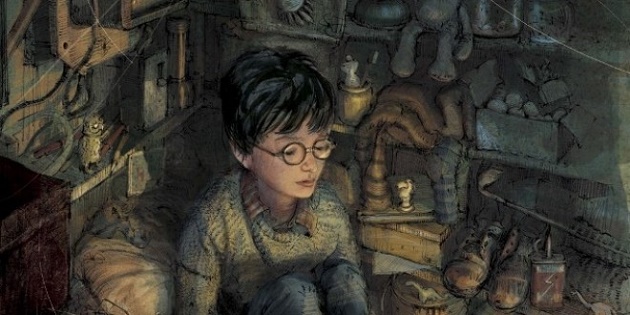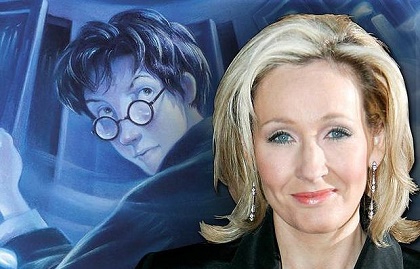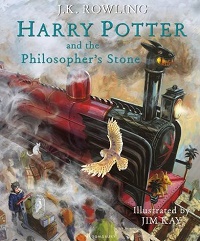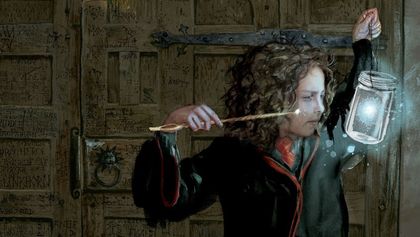Our character, relationships and even our spirituality are reflected in these books. Christians, however, have launched a campaign to prohibit the books in schools and libraries, some going as far as to burn copies in public.
 Jim Kay made the illustrations of the new edition.
Jim Kay made the illustrations of the new edition.
Eighteen years later, a new illustrated edition of J.K. Rowlings’s books – in album format, as interpreted by Jim Kay – has been published. By now, there is no question that Harry Potter is a classic of children’s literature, having helped many young people to discover the pleasure of reading. A lot of ink has been spilled in Christian circles regarding the dangers that these stories hold for children, but do their magic have anything to do with sorcery and occultism? Many now understand this series in the context of the feeling of orphanhood among the divorce generation.
As is the case for any good story, Harry Potter not only entertains, but it tells us a lot about ourselves. Our character, relationships, priorities, communities and even spirituality are reflected in these books. Christians, however, have launched a campaign to prohibit the books in schools and libraries, some going as far as to burn copies in public. As in so many instances in History, I wonder whether we know who our real enemy is. The desire to protect society from evil has not always promoted our best values.
Potter-phobia should be circumspect in considering the facts, before pronouncing its sentence. Evangelical books such as Richard Abanes’ Harry Potter and the Bible, fail to provide any examples of anyone being led to occultism through reading the books. That is why, when talking about the hidden danger of this fantasy world, we should measure our words. We could otherwise be adding fuel to a sense of paranoia that has led to a new “witch hunt”.
 J.K. Rowling, author of the books.
J.K. Rowling, author of the books. Between 1380 and 1680 more than 40,000 women were burnt for sorcery in Europe. The evidence for the majority of these had been obtained through torture. In 1692, a group of girls in Salem, Massachusetts, started shouting, convulsing and barking like dogs. A year later, 19 people were executed for sorcery. Not one of the people brought before the court was declared innocent! The evidence provided was based on dreams or the defendants having warts or other physical deformities. We now have no certainty that any of the people sentenced had anything to do with the crime of which they were accused.
OUR FEARS
In “Harry Potter and the Prisoner of Azkaban”, the Defense Against the Dark Arts professor, Remus Lupin, introduces his third-year pupils to the study of boggarts. In the always precise words of Hermione, these creatures can “take the shape of whatever a particular person fears the most”. Lupin explains that that is why they live in dark and closed places. They have no real shape, but they take the shape of the thing that inspire the greatest terror in the person with whom they come into contact. For Neville, they take the shape of Professor Snape. In Ron’s case, they look like a hairy man-eating spider, following his horrible experience in “The Chamber of Secrets”.
However, for Lupin and Harry, they don’t take the direct shape of what they fear, but of what their fear represents. For Lupin it is a silvery white sphere floating in the air, in other words a moon, which terrorizes the professor because of what it can do when he becomes a weir-wolf. But for Harry, the boggart becomes a dementor, a creature that “sucks out its victims’ soul”. However, what Harry most fears is the Dark Lord, the sinister Lord Voldemort. The professor guesses his thoughts, but Harry says that although he had thought of Voldemort first, he has realised that what he fears most is in fact the dementors. Lupin explains it by saying that “that suggests that what you fear most of all is – fear”.
In a certain sense, the Harry Potter books are like a boggart. The threat that they represent comes from the fears that we, as readers, bring to the books. Those whose worst fear is sorcery and occultism, fear the threat posed by these books. Those who are afraid of the abuse and corruption that their children may face, see them as a slippery slope to a sick society. Parents who express concern, as in South Carolina, at their “serious tone of death, hate, lack of respect and sheer evil”, are not seeing Harry Potter, but their own fears. Those fears need to be faced…
THE MAGIC OF HARRY POTTER
The magic and sorcery of the Potter world is a fictional one, which vastly differs in tone and contents from the sorcery that Christianity is up against. The word that Rowling uses, wizard, rather than warlock, suggests as much. This is a medieval word that originally meant “wise man”. This is the magic that has, for centuries, been a part of children’s stories. There is no devil, or demons in the Potter world. Magic is simply a force or an instrument that characters use, like electricity.
This is the type of magic that we find in stories such as the “Chronicles of Narnia” by C. S. Lewis: a force that can be used for good, or for evil. This is the same magic that we see in the “Lord of the Rings” by J. R. R. Tolkien, although there it is somewhat more sophisticated due to the duality and the realism of the characters. It can be compared to the ring, a force that is essentially neutral, a form of power that, as Lord Acton famously said, “tends to corrupt”. One way of interpreting the magic of Tolkien and Rowling is to see its symbolic nature as a representation of the use of power.
The witches in Macbeth predict the future King of Scotland. They predict who it will be, but they don’t make it become a reality. Shakespeare’s story is therefore not one of sorcery, but of power, ambition and guilt. That is why Hermione does not give any importance to her magic, which is nothing but “Books! And cleverness!”. There are “more important things” for her, such as “friendship and bravery”. That is what Harry Potter is about: it is the story of a gifted yet vulnerable boy. Harry has friends with talent, but who are also vulnerable, having grown up in dysfunctional families, going through the problems of their times and discovering the power of good and evil.
 The first Harry Potter book now appeard in an illustrated edition.
The first Harry Potter book now appeard in an illustrated edition.In “The Philosopher’s Stone”, it is his effort and sacrifice, that mean that Harry’s courage and ingenuity, Ron’s skill at chess and Hermione’s logic, allow Harry to reach the final chamber to face Voldemort. It is the ambition of Quirrel and the hatred of Voldemort, that make their plans to obtain the Elixir of Life fail. That why, in the “Chamber of Secrets”, Hermione’s knowledge, Ron’s bravery and Dumbledore’s phoenix, enable Harry to face the image of a young Voldemort, who is finally beaten by a tooth taken from his own deadly basilisk. Therefore, magic is never the fundamental element with which problems are solved.
THE POWER OF LOVE
The strongest message in these stories is, in fact, that of the unbreakable power of love, to which Harry owes his life and which overcomes evil through an act of self-sacrifice. Far from denying the Gospel, the Harry Potter series opens the way for children and adults, to seek the truth and reality.
This isn’t a Christian allegory, as in the case of Lewis’ world of Narnia, where the character of Aslan is used as a representation of Christ. Regardless of Rowling’s faith – which many people unjustly ignore, even though she says herself to be a believer, and a member of the Presbyterian Church of Scotland –, Lord Voldermort is not the devil, and Azkaban is not hell. Even though, in its description, we can see traces of a Christian vision of the world, we are in the presence of a new exploration of the problem of good and evil, given that the Harry Potter stories are fundamentally moral.
Harry is like all of us: vulnerable and limited. He needs to wear glasses. We meet him as a defenceless baby, who has to grow up in an abusive family environment, with the sorrow of being an orphan that accompanies him for the rest of his life. When he makes friends at school, none of them are perfect, or able to do anything for themselves. The characters are thereby made not only believable, but we can also sympathise and identify with them. This imaginary world speaks precisely of its humanity. Despite his courage, Harry is full of doubt. His weakness attracts us more than his strength.
 Rowling's magic reflects mostly on real situations in life.
Rowling's magic reflects mostly on real situations in life.Every literary creation is also a moral one, and Harry Potter is no exception. All his world of magic is profoundly moral. No accusation could be more unjust than to say that Rowling’s books defend a universe of moral relativism, in which there are no absolute values. However, given that good an evil exist in Harry Potter’s world, its morality is not at all simplistic, but incredibly realistic, and is in line with the biblical premise that we live in a fallen world.
Things and people are not what they appear to be: those who appear to be evil, have redeeming features, and those who are apparently good, have great weaknesses. This is the case of characters such as Sirius Black, Remus Lupin or the professor Severus Snape.
If we are honest, we have to recognise that same ambiguity in ourselves. We identify with the words of Paul to the Romans: “For I do not do the good I want to do, but the evil I do not want to do—this I keep on doing.” (7:19). Whereby, “If we claim to be without sin, we deceive ourselves and the truth is not in us.” (1 John 1:8). We have all failed. We are not angels, or demons. Our moral world is a lot more complicated than the world of children’s stories. The last books in the series look further into Harry’s dark side because, who can fight against evil?
This is what sets the Gospel apart from all other form of moralization. Salvation is not found in the human struggle to try to be better persons, but in a costly redemption, through which One has freed us through sacrificial love.
This can be compared to the sacrifice made by Harry’s parents, who saved his life; to Black and Lupin’s readiness to die rather than betray their friends; or the way in which Harry, Ron and Hermione are constantly putting their life at risk for others. This is the redeeming power of love, by which One has laid down his life for His friends (John 15:13). “For if, while we were God’s enemies, we were reconciled to him through the death of his Son, how much more, having been reconciled, shall we be saved through his life!” (Romans 5:10). That life reveals, as Lewis would say, a “deeper magic”…

Las opiniones vertidas por nuestros colaboradores se realizan a nivel personal, pudiendo coincidir o no con la postura de la dirección de Protestante Digital.
Si quieres comentar o